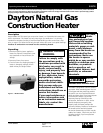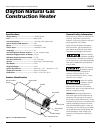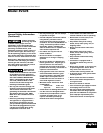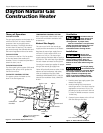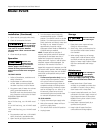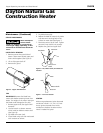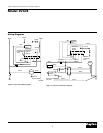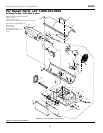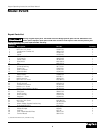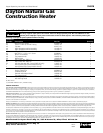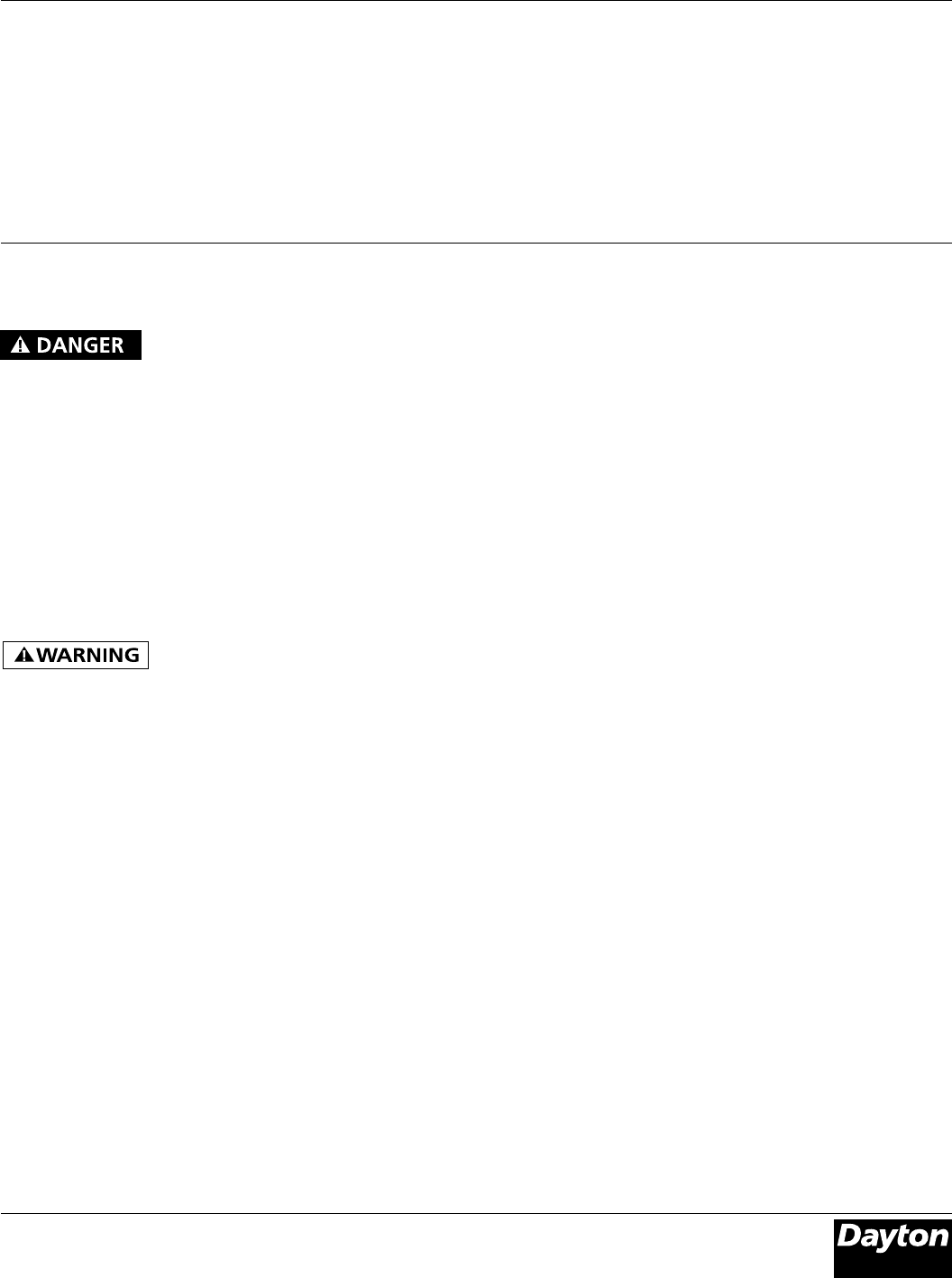
Version B - For Reduction G016.J
®
Dayton Operating Instructions and Parts Manual
3
Model 3VG78
Carbon monoxide
poisoning may lead
to death! Some people are more
affected by carbon monoxide than
others. Early signs of carbon monoxide
poisoning resemble the flu, with
headaches, dizziness, and/or nausea. If
you have these signs, the heater may
not be operating properly, or the areas
may not be sufficiently ventilated. Get
fresh air at once! Have heater serviced.
Natural Gas: Natural gas has a distinc-
tive odor. This odor helps you detect a
natural gas leak. However, the odor
may fade. Natural gas may be present
even though no odor exists.
• Install and use
heater with care.
Follow all local ordinances and codes.
In the absence of local ordinances
and codes, refer to the National Fuel
Gas Code handbook NFPA54/ANSI
Z223.1 and the Natural Gas Installa-
tion Code, CAN/CGA B149.1. This
instructs on the safe storage and
handling of flammable gases.
• Use only the electrical voltage and
frequency specified on model plate.
The electrical connections and
grounding of the heater shall follow
the National Electric Code, ANSI/
NFPA 70 or the Canadian Electrical
Code, Part 1.
• Electrical grounding instructions —
This appliance is equipped with a
three-prong (grounding) plug for
your protection against shock hazard
and should be plugged directly into
a properly grounded three-prong
receptacle or extension cord.
General Safety Information
(Continued)
• Locate heater on stable and level
surface if heater is hot or operating.
• Never block air inlet (rear) or air
outlet (front) of heater.
• Keep heater away from strong
drafts, wind, water spray, rain, or
dripping water.
• Never operate heater while unat-
tended.
• Keep heater away from strong
drafts, wind, water spray, rain, or
dripping water.
• Keep children and animals away
from heater.
• This heater is equipped with a
thermostat. Heater may start at
anytime.
• Never move, handle, or service a hot,
or operating heater. Severe burns
may result. You must wait 15
minutes after turning heater off.
• To prevent injury, wear gloves when
handling heater.
• Never attach duct work to heater.
• Do not alter heater. Keep heater in
its original state.
• Do not use heater if altered.
• Turn off natural gas supply to heater
and unplug when not in use.
• Use only original replacement parts.
This heater must use design-specific
parts. Do not substitute or use generic
parts. Improper replacement parts
could cause serious or fatal injuries.
• Use only natural gas. Do not attempt
to operate on LP gas.
• Provide adequate ventilation. Before
using heater, provide at least a
three-square-foot opening of fresh,
outside air for each 100,000 Btu/Hr of
rating. This heater produces carbon
monoxide, which is listed by the
State of California as a reproductive
toxin under Proposition 65.
• For indoor use only. Do not use
heater outdoors.
• Do not use heater in occupied
dwellings or in living or sleeping
quarters.
• Do not use heater in a basement or
below ground level. Propane gas is
heavier than air. If a leak occurs,
propane gas will sink to the lowest
possible level and may accumulate to
explosive concentrations.
• Keep appliance area clear and free
from combustible materials, gaso-
line, paint thinner, and other flam-
mable vapors and liquids. Dust is
combustible. Do not use heater in
areas with high dust content.
• Minimum heater clearances from
combustibles:
Outlet: 8 Ft. Sides: 2 Ft.
Top: 6 Ft. Rear: 2 Ft.
• Check heater for damage before each
use. Do not use a damaged heater.
• Check hose (if used) before each use
of heater. If highly worn or cut,
replace with hose specified by
manufacturer before using heater.



